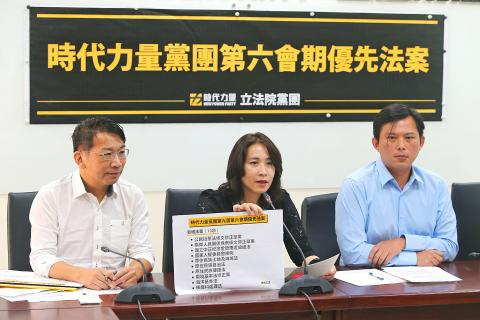The New Power Party (NPP) caucus yesterday said it would propose legal amendments to counter China’s new residency cards for Taiwanese and would draft a bill to ease restrictions on holding a national referendum.
The party would push for the passage of 40 bills and amendments in the coming legislative session, NPP Executive Chairman Huang Kuo-chang (黃國昌) told a news conference, adding that 10 of the bills would be new proposals.
The party would propose amendments to the Act Governing Relations Between the People of the Taiwan Area and the Mainland Area (台灣地區與大陸地區人民關係條例), as Beijing’s new residency cards for residents of Taiwan, Hong Kong and Macau have severe repercussions for Taiwan’s national sovereignty and the rights of Taiwanese, NPP Legislator Hsu Yung-ming (徐永明) said.

Photo: CNA
“The unilateral move by Beijing forces Taiwanese to apply with Chinese authorities for household registration to receive the residency card,” he said. “It is a ‘united front’ ploy by Beijing to undermine Taiwan’s national sovereignty and to deceive the world that Taiwan is under Chinese administration.”
“The government needs to fight this with countermeasures. The NPP will seek to amend the act to require Taiwanese who have applied for the Chinese residency card to report their conduct and to suspend or cancel their household registration” in Taiwan, Hsu added.
Beijing’s move seeks to circumvent Article 9-1 of the act, which stipulates that “the people of Taiwan Area may not have household registration in the Mainland Area or hold passports issued by the Mainland Area.”
“The amendment is a priority for the upcoming legislative session, because the Mainland Affairs Council has reacted to [China’s move] feebly. The government needs to react more strongly,” Hsu said.
Other proposals on the party’s agenda include amendments to the Referendum Act (公民投票法), the National Security Act (國家安全法), the Classified National Security Information Protection Act (國家機密保護法) and the Judges Act (法官法), which would seek to remove unsuitable judges and prosecutors who have broken the law, Huang said.
The party is also to propose a bill to institute a jury system for criminal prosecution.
NPP Legislator Kawlo Iyun Pacidal said she would lead the drive for legal amendments to protect the rights of the nation’s Aborigines, such as by changing the Mining Act (礦業法) to require mining companies to obtain the consent of communities near mining areas and to conduct an environmental impact assessment before starting operations.
She said she would also push for the passage of a proposed indigenous autonomy act; an indigenous traditional land and marine territory act; an indigenous traditional knowledge and biodiversity protection act; and an indigenous health act.
NPP Legislator Freddy Lim (林昶佐) said he would press for the passage of a proposed national languages development act, “so that people can speak their mother tongues and promote the nation’s major languages without discrimination, whether they be Mandarin, Hoklo [commonly known as Taiwanese], Hakka or Aboriginal languages.”

Taiwanese can file complaints with the Tourism Administration to report travel agencies if their activities caused termination of a person’s citizenship, Mainland Affairs Council Minister Chiu Chui-cheng (邱垂正) said yesterday, after a podcaster highlighted a case in which a person’s citizenship was canceled for receiving a single-use Chinese passport to enter Russia. The council is aware of incidents in which people who signed up through Chinese travel agencies for tours of Russia were told they could obtain Russian visas and fast-track border clearance, Chiu told reporters on the sidelines of an event in Taipei. However, the travel agencies actually applied

Japanese footwear brand Onitsuka Tiger today issued a public apology and said it has suspended an employee amid allegations that the staff member discriminated against a Vietnamese customer at its Taipei 101 store. Posting on the social media platform Threads yesterday, a user said that an employee at the store said that “those shoes are very expensive” when her friend, who is a migrant worker from Vietnam, asked for assistance. The employee then ignored her until she asked again, to which she replied: "We don't have a size 37." The post had amassed nearly 26,000 likes and 916 comments as of this

New measures aimed at making Taiwan more attractive to foreign professionals came into effect this month, the National Development Council said yesterday. Among the changes, international students at Taiwanese universities would be able to work in Taiwan without a work permit in the two years after they graduate, explainer materials provided by the council said. In addition, foreign nationals who graduated from one of the world’s top 200 universities within the past five years can also apply for a two-year open work permit. Previously, those graduates would have needed to apply for a work permit using point-based criteria or have a Taiwanese company

The Shilin District Prosecutors’ Office yesterday indicted two Taiwanese and issued a wanted notice for Pete Liu (劉作虎), founder of Shenzhen-based smartphone manufacturer OnePlus Technology Co (萬普拉斯科技), for allegedly contravening the Act Governing Relations Between the People of the Taiwan Area and the Mainland Area (臺灣地區與大陸地區人民關係條例) by poaching 70 engineers in Taiwan. Liu allegedly traveled to Taiwan at the end of 2014 and met with a Taiwanese man surnamed Lin (林) to discuss establishing a mobile software research and development (R&D) team in Taiwan, prosecutors said. Without approval from the government, Lin, following Liu’s instructions, recruited more than 70 software